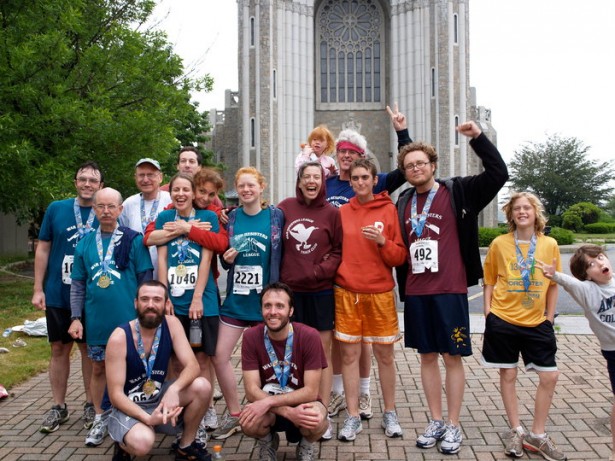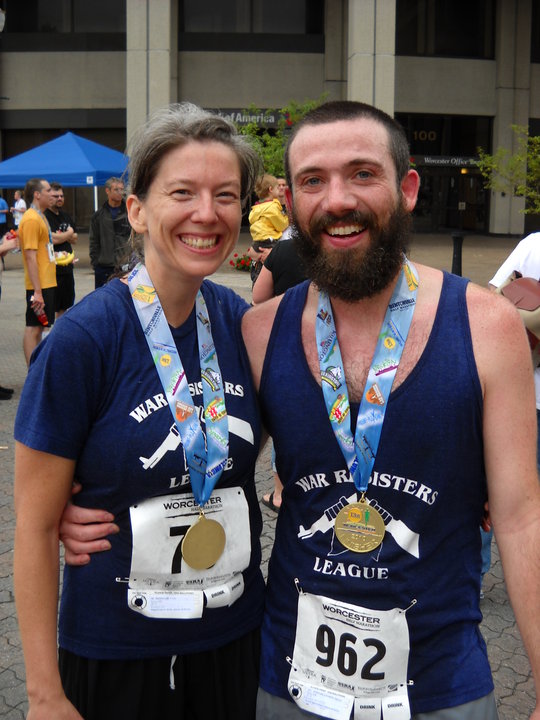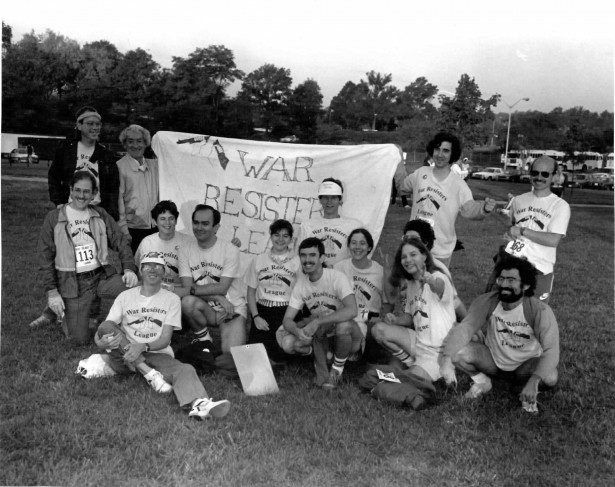
I started running after a bad break-up. With more than a decade of relationship over, there was a lot of uncertainty and questions. How to heal? How to hold on to friendships forged in our couplehood now that I was single? Who was I apart from this person? What next? What is my life about? Where would I live? What would I do? How could I turn anger and hurt into new possibility, direction and meaning? Incessant, pressing, urgent questions….
Step by step, breath by breath, mile by mile, the answers came. Or was it that what came was the space for these questions to hang? At first, reaching the end of my block seemed like a major accomplishment. Soon it was the edge of Red Hook, Brooklyn, where I was living. Then I ventured further — Prospect Park to the Manhattan Bridge and then over and then back, and then Central Park. I did not listen to music. I listened to my breath. I counted to 20 over and over and over again. I counted dogs and trees and parked cars. I prayed, and I asked my questions.
I trained for the Hartford half marathon in October 2009. I have a vivid memory of crossing mile nine in that race and thinking, “I have never run this far before in my life. I am here. I am doing this.” Crossing the finish line a while later, I broke down in tears. I was so proud of myself and so surprised. I was ready for my new life. I was done grieving what was gone and ready for what was next. The empty spaces had filled in with answers, and with new questions.
Running led me to the New York Catholic Worker and to the end of my job as a Senior Program Associate of the Arms and Security Initiative — a project of the New America Foundation. Running led me out of Brooklyn, out of old bad habits, into a new sense of mission and purpose and commitment to service and resistance. But, perhaps best of all, running led me into love.

My husband Patrick and I fell in love running. We restarted the War Resisters League Track Club. In the 1970s and 1980s, peace activist runners entered the Marine Marathon, the Army Ten Miler and other military sponsored runs wearing peace t-shirts and carrying banners (when they could). Bill Ofenlach, who ran the Army Ten Miler with the club in 1988 (and probably did pretty well), told me, “Long runs teach patience and are good preparation for a long vigil, physically and mentally. It is also a welcome relief from interminable meetings.”
Patrick and I tried to pick up where they left off (we have yet to do a Marine or Army race, though). We ordered t-shirts and recruited runners. The Ted Corbitt Run, a frigid 15K in Central Park; a cross-country mud slog a few weeks later in Van Cortland Park; the August Bronx half marathon where we were buoyed by great music and crowds; the Worcester half marathon that more than 20 War Resisters ran with bounding exuberance; the Twilight Run at Bluff Point right before Patrick and I got married; the True Colors run in Hartford which we ran in a relentless downpour; the Stratton Faxon run in New Haven where I got more grief for my Red Sox hat than for my War Resisters League t-shirt. I loved every one of these runs and all the practice in between.
Jerry and Molly — my brother and sister in law — are the real runners in the family. They tried to get me interested a long time ago. On October 7, 2001, we all traveled up to Maine. My sister in law and her brother ran the marathon. Molly came in third in her age group. Jerry says she is the real runner, still hitting 7.5-minutes mile after mile and after three kids. I cried watching her cross the finish line, the effort and triumph was raw on her face. My brother ran the half. I finished the half, but I walked a lot of the way.
Waiting for our order at a pizza parlor afterwards, we watched President George W. Bush announce the beginning of the war on terror and the initial bombing of Afghanistan. The war-lust vibe hung thick in the air — vengeance would be ours. Meanwhile, New York City was still smoldering and we — her people — were still pleading “our grief is not a cry for war.”
My brother says, “For me, running is a physical and a spiritual thing. I never run with anyone, I can’t talk when I am running. It is a solitary experience, a time to be out in the elements, to be alone. In my first half marathon, I kept thinking: I don’t know if I can get to the finish line, but I can run right now, and I’ll just keep going. If I have to stop in a little while, that is okay. But I am going to keep going. Running has taught me to pace myself, not just in sneakers, but in life. It helps me set a sustainable pace and rhythm in my life and work.” He and Molly are running the Kalamazoo Marathon on May 5.
Patrick, Rosena, Seamus and I were supposed to be in Boston on Monday, April 15. Our good friend ran the Boston marathon and we wanted to be there to cheer her over the finish line. Over the weekend, we decided that heading into Boston on Patriot’s Day with a six year old and a nine month old was too much for us, and we went straight to Baltimore for the spring break week. We started getting text messages and news about the explosions on the long drive down to Baltimore. Patrick and I looked at each other, using the parent-shorthand of whispers, raised eyebrows and long words so as to not alarm Rosena: “We would have been right there,” our eyes said to one another. “Our friends were right there.” They turned out to be unscathed physically, but they will carry the fear and anger for a long time. And they will carry what they saw and experienced forever.
As I write, there is still no real information about the motive of the Boston Marathon bombers. There’s a lot of hard work ahead for law enforcement officials. Already, we have seen one whole episode of the almost inevitable and totally unconscionable game of scapegoat the Arab play out. It is as sad as it is unsurprising. But also, we have seen the strength and compassion and vitality of the running community — embodied in the runners who kept running after the finish line, all the way to the hospital to give blood and right back into the melee to help the wounded; embodied in the pledges that next year the Boston Marathon will be bigger and stronger and fiercer and faster than ever before; embodied in the vigils and prayer circles and solidarity runs that sprang out of people’s need to be together in times of terror and tragedy.
My friend Scott Schaeffer-Duffy ran the marathon on Monday. He cramped up at mile 20, and only with the encouragement of his son Aiden did he cross the finish line 15 minutes before the bombs went off. Scott and his wife Claire live at the Worcester Catholic Worker, have four children, and have spent time in war zones around the world. He reflected after the marathon that “besides feeling heartsick at this cruelty done to such a positive and even innocent event, the sound of the bombs going off a block away from me and my son Aiden brought to mind the fragility of life in so many countries where innocent civilians are struck down by suicide bombs, IEDs, drones, mortars, land mines, cluster bombs, snipers … We feel the pain of Boston. I feel it, because it happened near me and my family … But the loss of those who were killed in a disco in Israel, outside a pub in London, gathering firewood in Afghanistan, or at a wedding in Iraq were all someone’s family and friends. The bombings in Boston, no matter who did them and for whatever reason, deepen my disgust for violence and yearning for peace.”
Scott also praised the running community. “Runners push themselves,” he said. “They take on suffering with virtually no acknowledgment for it, more often ridicule. They — I should say “we” — are people who know that joy in life does not come cheap. It must be earned through endurance and then savored with friends sharing good food, music and beer.” Amen.

“A day without sweat is a day to regret,” was the mantra of our family friend Peter DeMott. Amen, again. A war veteran and peace activist, husband to Ellen and father of four amazing young women, Peter died in February 2009. His family and community organized the Peter DeMott Peace Trot in Ithaca, New York, in his honor and memory the following year. Three years later it is going strong and promises to be bigger than ever. Peter was also fond of saying, “A day without perspiration is a day for self-recrimination.” Running the Trot will be a great way to start getting into shape for the Boston Marathon next year, so come on out and run for peace, run for friendship, run for nonviolence, run for family, run for community. Come on out and run against fear and hatred and bombings and terror and tyranny and BBs and small nails and lost limbs and lost lives — in Boston, in Baghdad, in Mogadishu and anywhere else in the world.

I’M GLAD I WASN’T IN BOSTON. IT BREAKS MY HEART THAT SUCH A HORRIBLE THING HAPPENED IN MY HOME TOWN. NO PLACE IS SAFE, AND ONE CANNOT RUN AND HIDE FROM THE VIOLENCE WE HAVE CREATED. WE MUST FIGHT WHAT WE HAVE CREATED AND PUT AN END TO THIS MESS. WE MUST RE-BUILD THE WORLD AND CREATE A NEW SOCIETY BASED ON LOVE AND NONVIOLENCE.
“Violence we have created?” WTF. These guys didn’t live in a wore-torn area. They lived in f–cking BOSTON for a decade. They’re not even Middle-eastern, but from Russia. But they did accept a form of religious faith and identity and became radicalized.
You can’t blame the victim and get all, “lets just have peace and love” Because there are people in this world who don’t want peace or love. These two brothers are just two of them.
Just like those on the left. Place blame everywhere but on the people who killed. Not everything is relative. And your song is a very tired song.
DANIEL–Boston has suffered from its share of violence for a very long time. Violence, racism and class conflict. Boston will not escape nonviolent revolution. I will see to it be sure of that.
Very well written and thoughtful.
I couldn’t agree with you more.
Some comments from Facebook:
Valory Bennett: We could learn a lot from countries like the UK about bombings and gun control. Sadly, we are reactive and not proactive
Kathleen Kanet: It is the organization, strength of the community, not the politicians who will both respond and work to end the violence done to the community.
Ira Spitzer: thanks for sharing!
Rita Lasar: how glad and proud i am to count you a friend. thanks so much for this.
Heidi Woolever: I run every race in the shirt and now I’ve worn it out. I need to order a new one! Amy and I will be running the Brooklyn half in them next month.
Erin Thompson: I like this a lot. Thanks Frida.
Felice Cohen-Joppa: I have been thinking about Scott… thanks, Frida.
Gorgeous piece, Frida. Thank you.